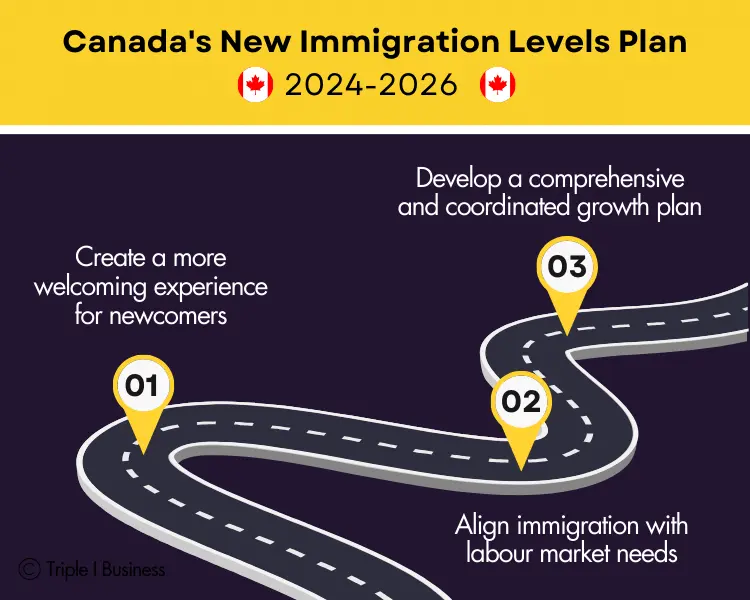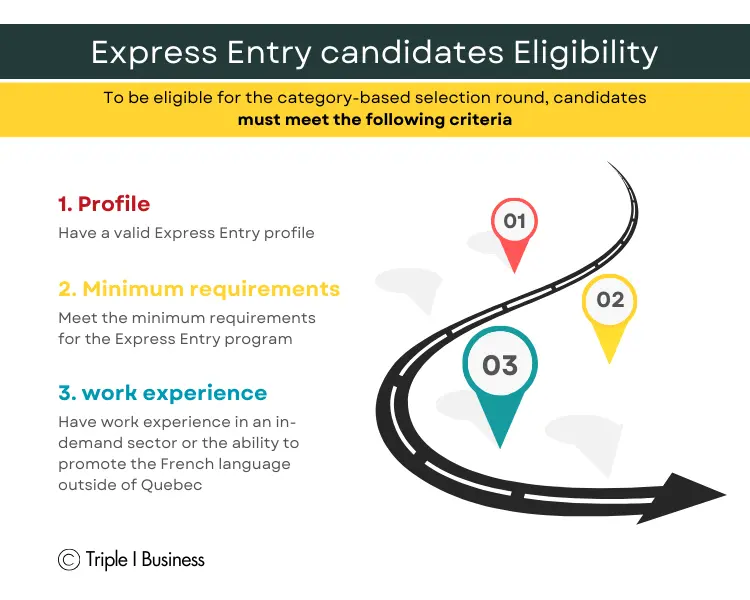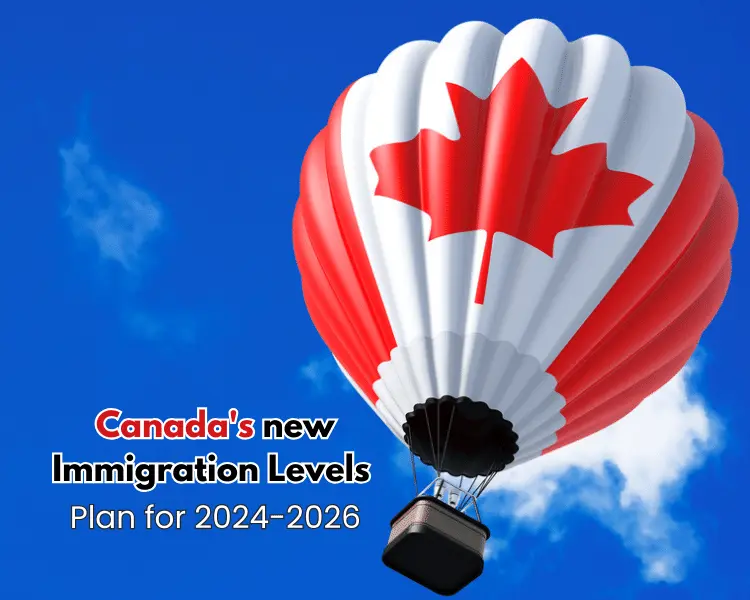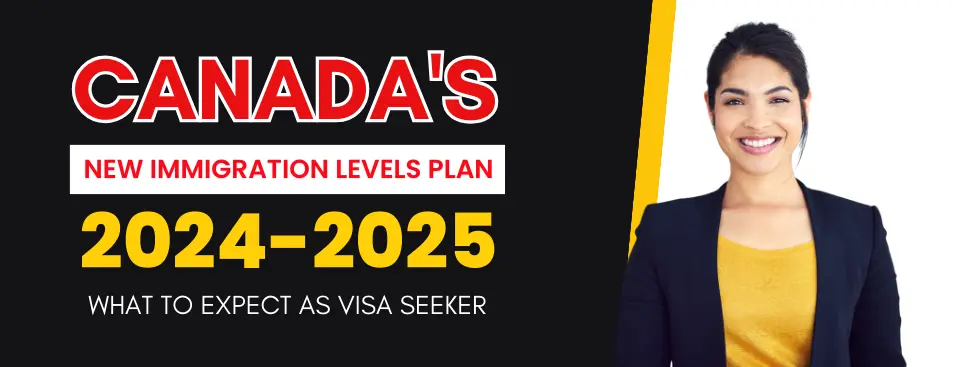New Immigration Levels Plan for Canada: 2024-2026
Canada's Immigration Levels Plan for 2024-2026 is set to be released today, November 1, 2023.
The plan will outline the number of new permanent residents that Canada will welcome over the next three years, under each of the three immigration classes: economic, family, and humanitarian.
Canada is pursuing a new strategy to improve its immigration system, which was unveiled on October 31, 2023.
The new strategy has three major goals:

Create a more welcoming experience for newcomers
Align immigration with labour market needs
Develop a comprehensive and coordinated growth plan
Canada began to increase immigration levels in the late 1980s.
This was in response to a shortage of labour and a desire to boost the economy. In 2022, Canada welcomed over 437,000 new permanent residents, the highest number ever.
Despite the current affordability crisis and housing shortage in Canada, the government is maintaining high immigration targets.
This is due to a shortage of skilled labour, a low birth rate, and the impending retirement of millions of Canadian workers.
The most recent job vacancy data shows that there were over 700,000 vacant jobs in Canada in July 2023. To address this labour shortage,
IRCC has introduced category-based selection rounds of invitations for Express Entry candidates who have work experience in an in-demand sector, or the ability to promote the French language outside of Quebec.
What can we expect from the new Immigration Levels Plan for 2024-2026? It is likely that the plan will continue to focus on economic-class immigration,
With targets for family and humanitarian classes remaining relatively stable. It is also possible that the plan will include new measures to support the integration of newcomers into Canadian society.
Overall, the new Immigration Levels Plan for 2024-2026 is a reflection of Canada's commitment to immigration and its role in the country's future growth and prosperity.
What are the three major goals of the new strategy?
The three major goals of the new strategy are to:
Create a more welcoming experience for newcomers.
Align immigration with labour market needs,
Develop a comprehensive and coordinated growth plan.
How will the new strategy improve the immigration experience for newcomers?
The new strategy will focus on improving the efficiency and transparency of the immigration process, as well as providing more support to newcomers once they arrive in Canada. This includes initiatives such as:
Reducing the processing times for immigration applications
Providing more online services and tools for newcomers
Expanding settlement and integration programs
How will the new strategy align immigration with labour market needs?
The new strategy will focus on attracting and retaining skilled workers in high-demand sectors. This includes initiatives such as:
Prioritizing Express Entry candidates with work experience in in-demand sectors
Expanding the Provincial Nominee Program (PNP) to allow provinces and territories to select more skilled workers
Creating new pathways to permanent residency for international students and temporary foreign workers
What are category-based selection rounds?
Category-based selection rounds are a new way of inviting Express Entry candidates to apply for permanent residency.
In these rounds, IRCC invites candidates who have work experience in a specific in-demand sector or who have the ability to promote the French language outside of Quebec.
Which Express Entry candidates are eligible for category-based selection rounds?
To be eligible for a category-based selection round, candidates must meet the following criteria:

Have a valid Express Entry profile
Meet the minimum requirements for the Express Entry program
Have work experience in an in-demand sector or the ability to promote the French language outside of Quebec
How can Express Entry candidates improve their chances of being invited in a category-based selection round?
To improve their chances of being invited in a category-based selection round, Express Entry candidates should:
Make sure their profile is complete and up-to-date
Ensure that their work experience is relevant to the in-demand sector they are interested in
Consider taking French language proficiency tests if they are interested in promoting the French language outside of Quebec
What are the predicted targets for each immigration class in the new Immigration Levels Plan?
The following are the predicted targets for each immigration class in the new Immigration Levels Plan:
Economic class: 325,000
Family class: 100,000
Refugee and humanitarian class: 40,000
How will the new Immigration Levels Plan help to address Canada's labour shortage?
The new Immigration Levels Plan is designed to help address Canada's labour shortage by increasing the number of skilled workers admitted to the country each year.
The plan also includes measures to attract and retain skilled workers in high-demand sectors.
What impact will the new Immigration Levels Plan have on the Canadian economy?
The new Immigration Levels Plan is expected to have a positive impact on the Canadian economy by increasing the labour force and boosting economic growth.
Immigration also helps to offset Canada's low birth rate and ageing population.
Which provinces are welcoming the most immigrants in 2023?
The following are the top five provinces for immigration in 2023:
Ontario
British Columbia
Alberta
Quebec
Manitoba
What are the top in-demand jobs in each province?
The top in-demand jobs in each province vary, but some of the most common include:
Healthcare workers
Teachers
Engineers
IT professionals
Construction workers
What are the provincial nominee programs (PNPs) and how can immigrants apply?
The Provincial Nominee Programs (PNPs) are a way for provinces and territories to select immigrants who meet their specific needs.
Immigrants can apply for a PNP nomination by submitting an application to the province or territory they are interested in.
What types of online immigration services are available in Canada?

The following are some of the types of online immigration services that are available in Canada:
Immigration application processing: IRCC offers a number of online services for processing immigration applications, including Express Entry applications, spousal sponsorship applications, and permanent residency card renewal applications.
Immigration information and resources: IRCC's website provides a wealth of information on the Canadian immigration system, including eligibility requirements, application forms, and processing times.
Settlement and integration services: A number of organizations in Canada offer online settlement and integration services for newcomers, such as job search assistance, language training, and cultural orientation.
How can immigrants use online services to apply for permanent residency or other immigration benefits?
To apply for permanent residency or other immigration benefits using online services, immigrants should create an account on IRCC's website.
Once they have created an account, they can access the online services they need.
Most online immigration applications require immigrants to provide supporting documentation, such as a passport, birth certificate, and proof of education or work experience. Immigrants can upload this documentation electronically through the IRCC website.
What are the benefits of using online immigration services?
There are a number of benefits to using online immigration services, including:
Convenience: Online immigration services can be accessed from anywhere, at any time.
Speed: Online immigration applications are typically processed faster than paper applications.
Accuracy: Online immigration applications are less likely to contain errors than paper applications.
Security: Online immigration services are secure and protect immigrants' personal information.
Overall, online immigration services offer a convenient, efficient, and secure way for immigrants to apply for permanent residency or other immigration benefits in Canada.
For more information related to a Canada permanent residency visa or any other visa's Call or WhatsApp: +91 859 574 4633 or Email: [email protected]
Comments
